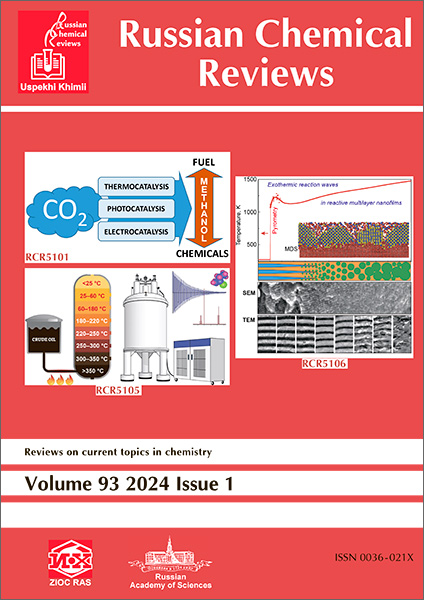Physical chemistry and technological applications of gas hydrates: topical aspects
IF 6
2区 化学
Q1 CHEMISTRY, MULTIDISCIPLINARY
引用次数: 1
Abstract
The review considers the research and engineering works in selected fields of the physical chemistry of gas hydrates and gas hydrate technologies, mainly performed over the last 10–15 years. Data on the hydrate structures are given, including the structures formed during phase transitions at low temperatures, and on new hydrate structures that are formed under ultrahigh pressures. The dynamics of guest and host subsystems is considered in brief. Phase diagrams of systems involving hydrate formation (in particular, in some porous media) and methods for calculating phase equilibria and compositions of hydrates in these systems are analyzed. Data on the hydrates formed by ‘non-classical’ hydrate formers (alcohols, amines, ammonia, etc.) studied in the last decade and on some of their properties are presented. The Section devoted to hydrate formation kinetics addresses the effect of compounds dissolved in water (surfactants, low-dosage inhibitors) and catalysts on this process. The hydrate growth dynamics on the water surface and hydrate decomposition-formation processes in disperse systems are discussed. Among technological applications, the attention is focused on gas storage and transportation in the hydrate form. Methods for the preparation of hydrates are considered. The bibliography includes 618 references.天然气水合物的物理化学和技术应用:专题方面
这篇综述主要考虑了过去10-15年来在天然气水合物物理化学和天然气水合物技术的选定领域进行的研究和工程工作。给出了水合物结构的数据,包括低温相变过程中形成的结构,以及超高压下形成的新水合物结构。简要地考虑了客户机和主机子系统的动态。分析了水合物形成体系的相图(特别是在一些多孔介质中)以及计算这些体系中水合物相平衡和组成的方法。介绍了近十年来研究的由“非经典”水合物形成物(醇、胺、氨等)形成的水合物及其一些性质的数据。水合物形成动力学部分讨论了溶解在水中的化合物(表面活性剂、低剂量抑制剂)和催化剂对这一过程的影响。讨论了水合物在水面上的生长动力学和分散体系中水合物的分解生成过程。在技术应用中,以水合物形式储存和运输天然气是人们关注的焦点。讨论了水合物的制备方法。参考书目包括618篇参考文献。
本文章由计算机程序翻译,如有差异,请以英文原文为准。
求助全文
约1分钟内获得全文
求助全文
来源期刊

Russian Chemical Reviews
化学-化学综合
CiteScore
13.00
自引率
5.20%
发文量
27
审稿时长
6-12 weeks
期刊介绍:
Russian Chemical Reviews serves as a complete translation of the esteemed monthly review journal Uspekhi Khimii, which has been a prominent figure in Russian scientific journals since its establishment in 1932. It offers comprehensive access to the advancements made by chemists from Russia and other former Soviet Union countries.
Established in 1932, Russian Chemical Reviews is committed to publishing timely and significant review articles encompassing various facets of modern chemistry, including chemical physics, physical chemistry, computational and theoretical chemistry, catalysis, coordination chemistry, analytical chemistry, organic, organometallic, and organoelement chemistry, chemistry of macromolecules, applied chemistry, biochemistry, bio-organic chemistry, biomolecular chemistry, medicinal chemistry, materials chemistry, nanochemistry, nanostructures, and environmental chemistry.
 求助内容:
求助内容: 应助结果提醒方式:
应助结果提醒方式:


